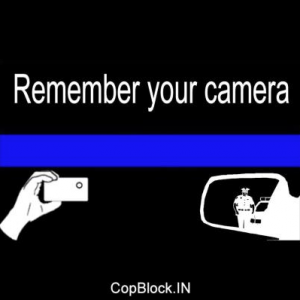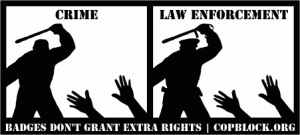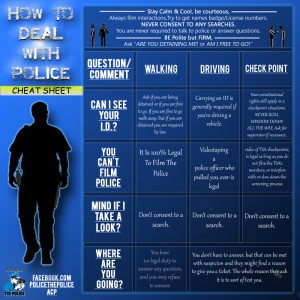OFF THE WIRE
“Confessions of a Traffic Cop” was written by Phil Berg and posted at Yahoo.com. After reading the article I thought it would make a good post here at CopBlock.org. I didn’t want to copy and paste the whole article so will only focus on a few of the questions. You can, and I encourage it, read the entire article by clicking here.
Phil, the author, interviewed Mike Brucks a now retired traffic cop of 22 years who claims to have wrote over 40,000 tickets (damn!) and now wants to share [brag about] his experiences. Phil’s questions are in bold, Mike’s answers are plain text and both (Phil’s and Mikes) are block quoted. I’ll add my two sense in outside of block quotes with italic font, so you know who said and wrote what.
Let’s get into the mind of a traffic cop, first question.
Don’t get me wrong, I don’t want people ticketed for speeding ever because it’s extortion, a racket. It’s a punishment with no actual proof of working, other than lining the pockets of government. I mean if laws restricting speeding worked, we wouldn’t be having this conversation.
And before you jump on me about speeding being unsafe, I’ll get there, just wait. Moving on.
Are speed limits too low?
Boy I’m confused. Are the speed limits too low or is Officer Mike simply allowing people to break the law? Is he implying that driving faster is more dangerous, yet advocating Officer’s use discretion by allowing faster driving? Maybe the last question will help clear things up.
Furthermore, Officer Mike talks about not chasing down the speeding biker because it’s unsafe. Well Officer Mike, if that’s your stance then how did you ever ticket anyone? You had to chase down all 40,000 people you wrote tickets for in your career and risked causing an accident for them, you and/or innocent public bystanders.
Congratulations Officer Mike. Your 22 years of being a traffic cop were completely worthless. All you did was prove you are a hypocrite. Your traffic stops were based off nothing more than your subjective feelings at that particular moment. Had you actually taken the time to think though your actions as a traffic cop, you very well would have concluded, that you are unable to preform the job with any sense of consistency. Just like you did this interview.
“Confessions of a Traffic Cop” was written by Phil Berg and posted at Yahoo.com. After reading the article I thought it would make a good post here at CopBlock.org. I didn’t want to copy and paste the whole article so will only focus on a few of the questions. You can, and I encourage it, read the entire article by clicking here.
Phil, the author, interviewed Mike Brucks a now retired traffic cop of 22 years who claims to have wrote over 40,000 tickets (damn!) and now wants to share [brag about] his experiences. Phil’s questions are in bold, Mike’s answers are plain text and both (Phil’s and Mikes) are block quoted. I’ll add my two sense in outside of block quotes with italic font, so you know who said and wrote what.
Let’s get into the mind of a traffic cop, first question.
Besides speeding, which is the reason for most tickets, what’s most likely to get a traffic cop’s attention?OK, good start. Officer Mike is actually concerned with safety, that’s good. I can get behind being safe. It’s nice to hear an Officer say he’s not as concerned the revenue generating, or the permission granting, aspects of the insurance, registration and plating business.
Seatbelts, cell phones, red lights, and stop signs. I concentrate on all the things that can cause an accident. There are some cops who write tickets for expired plates, for having no insurance or registration, but you’re not going to crash because of any of that. I focused on safety issues—that’s what I like to do.
How much leeway do you give someone before writing them a speeding ticket?There are two points to make here. First, how are motorist supposed to know what leeway the officer is giving? Maybe one day they drive by and Officer Mike is working so 75 in a 60 is ok but the next day, different cop, different results. Second, I’ve had Officers tell me time and time again, “the law is the law” and that they’re just enforcing those laws. Well in this case the law says 60 is the speed limit, not 80.
The speed limit in Texas used to be 60 mph, [and] well, out on the clear road where there’s a lot of visibility I give people leeway. I wouldn’t write tickets until they got to 80 mph.
Don’t get me wrong, I don’t want people ticketed for speeding ever because it’s extortion, a racket. It’s a punishment with no actual proof of working, other than lining the pockets of government. I mean if laws restricting speeding worked, we wouldn’t be having this conversation.
And before you jump on me about speeding being unsafe, I’ll get there, just wait. Moving on.
Are speed limits too low?
No, the traffic engineers, at least in Texas, are pretty good. It’s not that some parts of the highway are safer for speeding, it’s that drivers aren’t always paying attention. People die on lonely deserted stretches of road too. There are a lot of times drivers aren’t concentrating. They need to understand you’re going 100 feet per second on the highway. Above 75 mph things just happen so fast, [whether it's] a flat tire, a coyote, wind, dirt, or rocks. It’s not that much better now that cars are safer; reaction times are still the same.Wait, what? In the question before this Officer Mike allows a cushion, or uses his discretion, for speeders especially if there’s alot of ‘visibility.’ Now he says that Texas engineers are pretty good and that the 60 MPH speed limits are not too low. Officer Mike goes on to say that people die on deserted roadways too, that concentration is also a factor and that people need to understand that 75 mph is fast.
Boy I’m confused. Are the speed limits too low or is Officer Mike simply allowing people to break the law? Is he implying that driving faster is more dangerous, yet advocating Officer’s use discretion by allowing faster driving? Maybe the last question will help clear things up.
When do you not chase a speeder?This is why all driving laws that don’t address an accident/damage to another person, or their property, are bullsh*t. First, they don’t prevent any accidents, if anything, they create them. How many times has an accident been caused, or almost caused, by police lights on the side of the road. Or due to heavy braking when sneaky cops are spotted by speeding drivers?
I clocked a guy on a crotch-rocket bike doing 189 mph. Just let him go. Since police departments began to get sued for chasing speeders, around 1995, there’s a fine line. You have to determine if you can catch him, if chasing him will cause an accident for him, for you, for the public. There’s no way to catch anyone like that.
Furthermore, Officer Mike talks about not chasing down the speeding biker because it’s unsafe. Well Officer Mike, if that’s your stance then how did you ever ticket anyone? You had to chase down all 40,000 people you wrote tickets for in your career and risked causing an accident for them, you and/or innocent public bystanders.
Congratulations Officer Mike. Your 22 years of being a traffic cop were completely worthless. All you did was prove you are a hypocrite. Your traffic stops were based off nothing more than your subjective feelings at that particular moment. Had you actually taken the time to think though your actions as a traffic cop, you very well would have concluded, that you are unable to preform the job with any sense of consistency. Just like you did this interview.








